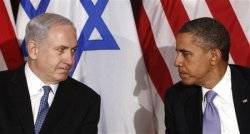The White House has denied reports of a rift with Prime Minister Binyamin Netanyahu, saying that the Israeli leader and President Barack Obama have reaffirmed the two countries' commitment to prevent Iran from obtaining a nuclear weapon.
Obama and Netanyahu spoke for an hour by telephone on Tuesday night and the White House said in a statement later that the two men agreed to continue "close consultations going forward" regarding Iran's nuclear ambitions.
The White House denied published reports that Obama had rejected Netanyahu's request to meet with Obama in Washington next week. Netanyahu has met Obama on each of his previous US trips as Israeli leader since 2009.
No such request was made or rejected, White House spokesman Tommy Vietor said.
Netanyahu's strong words risk antagonizing Obama in the midst of a closely fought a re-election campaign and could strain relations with the US, Israel's closest and most important ally.
The unusual, late-night announcement from the White House comes after Netanyahu criticized what he called the world's failure to spell out what would provoke a US-led military strike against Iranian nuclear facilities.
Earlier on Tuesday, Netanyahu had said that the international community could not ask Israel to keep waiting before "acting against Iran" if it has not laid down "red lines" over Tehran's suspected nuclear programme.
"The world tells Israel, 'Wait, there's still time.' And I say, 'Wait for what? Wait until when?'" he said.
"Those in the international community who refuse to put red lines before Iran don't have a moral right to place a red light before Israel."
Netanyahu, a former captain in Israel's special forces, reiterated his defense of Israel's "right" to attack Iran.
"So far we can say with certainty that diplomacy and sanctions haven't worked," he said.
"The sanctions have hurt the Iranian economy, but they haven't stopped the Iranian nuclear programme. That's a fact. And the fact is that every day that passes, Iran gets closer and closer to nuclear bombs.
"Now if Iran knows that there is no red line - if Iran knows that there is no deadline, what will it do? Exactly what it's doing. It's continuing, without any interference, towards obtaining nuclear weapons capability and from there, nuclear bombs."
The website of Israel's daily newspaper Haaretz called Netanyahu's words "an unprecedented verbal attack on the US government".
Relations between Obama and Israel's leadership have been strained over Iran and other issues, such as Jewish settlement building in the occupied West Bank.
But Netanyahu had never framed in moral terms his differences with the current US president - who for his part has pledged he will "always have Israel's back" and is deep in a re-election campaign.
Meanwhile, Republican challenger Mitt Romney has accused Obama of throwing Israel "under the bus".
Unpopular position
The position of Israeli leaders is not popular overseas, with Guido Westerwelle, Germany's foreign minister, stating his opposition to a unilateral Israeli strike against Iran during a meeting with Netanyahu on Sunday.
"Our goal remains a political and diplomatic solution," Westerwelle said.
In the US, a July poll carried out by the Council on Foreign Relations showed that US citizens favored diplomacy over military action by almost four to one, with only 14 per cent of respondents believing the US government should encourage an Israeli attack on suspected Iranian nuclear sites.
At home in Israel, many public figures and former officials oppose Netanyahu's hawkish position, reportedly also now including Defense Minister Ehud Barak.
Meir Dagan, the former head of Israel's Mossad intelligence agency, recently told The New Yorker magazine that "an Israeli bombing would lead to a regional war and solve the internal problems of the Islamic Republic of Iran. It would galvanize Iranian society behind the leadership and nuclear issue."
He continued: "It would justify Iran in rebuilding its nuclear project and saying: 'Look, see, we were attacked by the Zionist enemy and we clearly need to have it'."
Iranian officials say the country, as a signatory to the nuclear Non-Proliferation Treaty, is entitled to develop nuclear energy infrastructure, and deny any attempts to build nuclear weapons.
PHOTO CAPTION
U.S. President Barack Obama (R) meets Israel's Prime Minister Benjamin Netanyahu at the United Nations in New York in this file photo taken September 21, 2011.
Aljazeera


 Home
Home Discover Islam
Discover Islam Quran Recitations
Quran Recitations Lectures
Lectures
 Fatwa
Fatwa Articles
Articles Fiqh
Fiqh E-Books
E-Books Boys & Girls
Boys & Girls  Hajj Rulings
Hajj Rulings Hajj Fatwas
Hajj Fatwas














